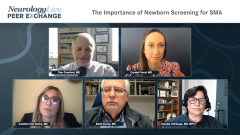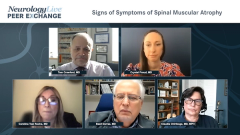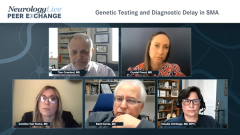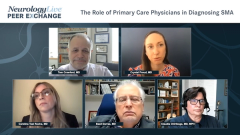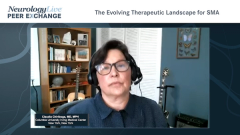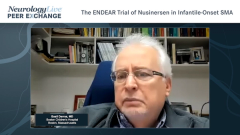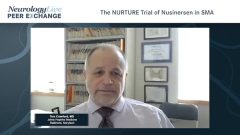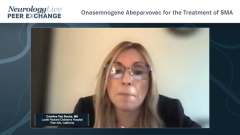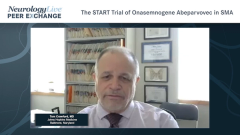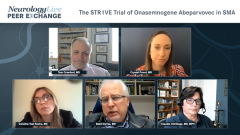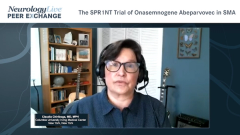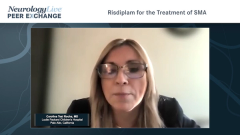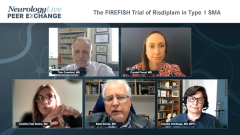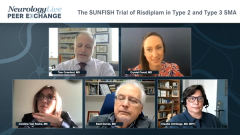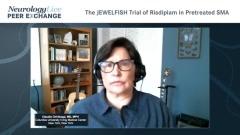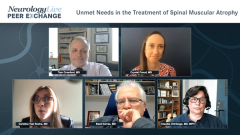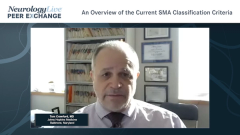
The SUNFISH Trial of Risdiplam in Type 2 and Type 3 SMA
Tom Crawford, MD, examines data from the SUNFISH trial of patients with type 2 and type 3 SMA and emphasizes the need for further data before risdiplam can be directly compared to other treatment options.
Episodes in this series

Crystal Proud, MD: The FIREFISH clinical trial was important for evaluation of this agent risdiplam in babies with SMA [spinal muscular atrophy] Type 1, or classically symptomatic babies. Tom, can you walk us through the SUNFISH clinical trial, evaluating efficacy in the later-onset patients?
Thomas Crawford, MD: l will agree with all my peers that the efficacy data are noncomparable. We are not going to be able to distinguish the effects of this with the present clinical trials. The problem with safety is it is related to the end, or how many people you have treated for a period of time. Of course, with safety, we worry about not only the severity of it. If it is a mildly discomforting sensation that you must deal with, that is tolerance. If it is a life-threatening complication, that is a completely different thing. Measuring that on a single metric and comparing it one to another is itself difficult. The point Basil brought up—about the possibility of non-CNS [central nervous system]–related SMN being symptomatic—I cannot let that go uncommented upon. I’m of the opinion, and of course I like my opinions, that the nonneurologic complications can be seen as downstream complications of sarcopenia itself. We have not yet demonstrated that the low levels of SMN that are present in other tissues in fact lead to any other symptoms other than the one we know about, in terms of SMA.
Now, getting to the other trial—the SUNFISH trial—we have the advantage that the company through Laurent] Servais, MD, PhD, just presented these data at the MDA [Muscular Dystrophy Association] conference 2 weeks ago; it was a nice summary of the experience with SUNFISH to date. I’ll take the advantage of a paper here; they have now treated 320 kids with SMA type 2 or 3 for an average of 9 months. In that group, the SAEs [serious adverse events] that were thought to be related to the drug and hence led to a modification of dose, was seen in some 3.5% of patients. The AEs [adverse events] that led to dose modification occurred at a rate of 14%. It is probably worth noting that people were on that trial for the duration, so they may have decided to endure a milder AE, whereas in the commercial space, they might say, “To heck with it. I’m going to go over to the other agent now that I have a choice.” That choice was not available to them then. The other thing that is probably worth noting is if there was a delayed complication—something along the lines of the bad effects that happened with Felbatol that weren’t identified for several years after the fact—we wouldn’t know about it in the present group. I do think that the exposure of the experience with how it went with the numbers with nusinersen, 10,000 or more people, is impressive.
I am hoping and expecting that we will get more information about risdiplam, but we are not there yet where we can compare apples to apples on the safety side of things. Having said that, risdiplam is largely tolerated by most people who take it. Certainly, for those who are not able to get nusinersen for other reasons—because of spinal tap problems, or finances, or insurance coverage, or whatever it might be—any of these agents is better than nothing. These agents need to be prescribed as soon as possible.
Claudia A. Chiriboga-Klein, MD: I have one comment on what Tom said. With SUNFISH, I was surprised that they actually found anything significant because the patient population was much more severe and had more contracture and scoliosis. If I were going to design a study, that would not be the study I would design to find efficacy, and they did. I think that is a testament to the medication.
Crystal Proud, MD: Thank you for watching this NeurologyLive® Peer Exchange. If you enjoyed the content, please subscribe to our e-newsletters to receive upcoming Peer Exchanges and other great content right in your inbox.
Transcript Edited for Clarity
Newsletter
Keep your finger on the pulse of neurology—subscribe to NeurologyLive for expert interviews, new data, and breakthrough treatment updates.

